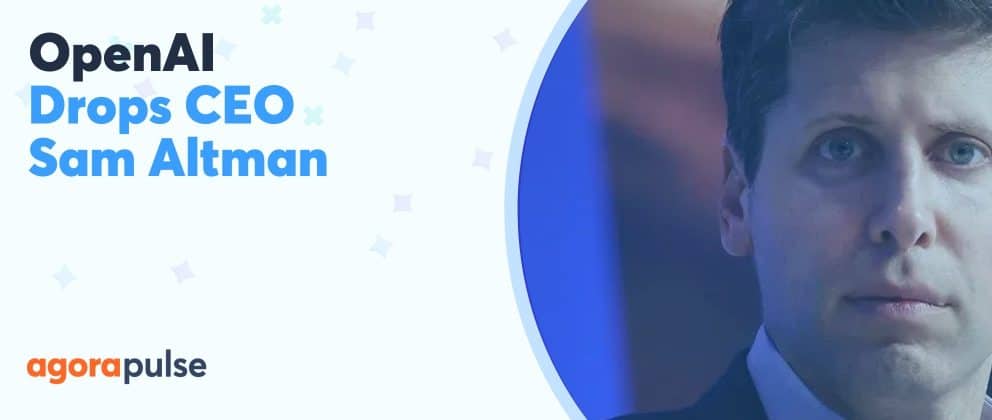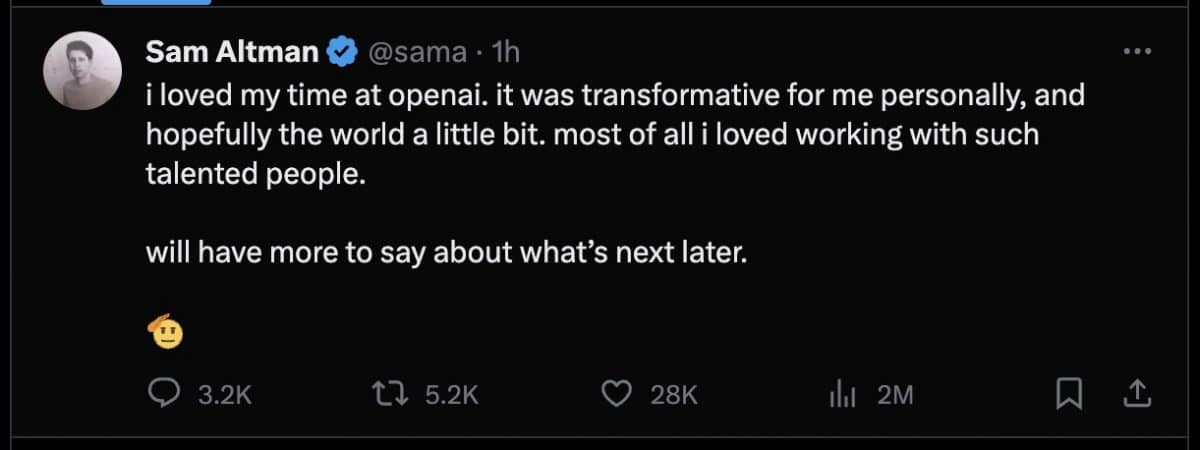In a surprising turn of events, OpenAI, the trailblazing AI research lab known for its revolutionary products like ChatGPT and DALL-E, has fired CEO and co-founder Sam Altman from the board of directors.
The company announced the shocking news on their blog late Friday afternoon, stating that:
“Mr. Altman’s departure follows a deliberative review process by the board, which concluded that he was not consistently candid in his communications with the board, hindering its ability to exercise its responsibilities. The board no longer has confidence in his ability to continue leading OpenAI.”
What’s more interesting is that Greg Brockman, the co-founder of OpenAI, is also stepping down from the board. While he will remain at the company, it still marks a major shift in the company’s leadership structure. This leadership shakeup comes at a critical time for OpenAI, as the company continues to push the boundaries of what’s possible with machine learning and generative technologies like ChatGPT.
Mira Murati Steps In as CEO
Stepping into the interim CEO role is Mira Murati, previously the Chief Technology Officer at OpenAI.
Murati, who has been with the company since 2018, is known for her role in leading groundbreaking projects like ChatGPT and DALL-E. She also has a solid background in AI governance and policy. Moreover, Murati has a deep understanding of both the company values and the operational aspects of the company.
Her approach to AI technology is not just about the technical innovation but also looks to tackle its broader societal impacts. Murati has been instrumental in navigating the discourse around AI’s role in the job market and education system, showcasing her vision for the use of AI.
Murati has also shared that she believes AI technology needs to be regulated in some way.
In an interview with TIME magazine, after being questioned on whether the government should play a role in regulating AI technology, Murati said,
“It’s important for OpenAI and companies like ours to bring this into the public consciousness in a way that’s controlled and responsible. But we’re a small group of people and we need a ton more input in this system and a lot more input that goes beyond the technologies—definitely regulators and governments and everyone else.”
If Murati does push for stricter AI governance practices within OpenAI and the AI industry as a whole, it could have a ripple effect on many aspects of the marketing industry.
The Potential Impact on Social Media Marketing
The leadership changes at OpenAI, especially with Mira Murati stepping in, could significantly impact social media marketing in the following ways:
Stricter AI Ethical Standards: With new leadership, there could be a stronger emphasis on ethical AI development. So, social media marketing tools powered by AI need to adhere to higher standards of fairness, transparency, and accountability, impacting how they target and interact with users.
Data Privacy and Usage Policies: Enhanced data governance could lead to stricter data privacy and usage regulations. Marketers might need to navigate more complex compliance landscapes when using AI for data-driven marketing strategies on social media.
Content Moderation Policies: Changes in AI governance could influence how AI is used for content moderation on social media platforms. This might lead to more sophisticated and ethically aligned content filtering, impacting how brands manage their online presence and reputation.
Algorithm Transparency: Improved governance could push for more transparency in AI algorithms. Social media marketers may gain better insights into how their content is ranked and displayed, leading to more informed marketing strategies.
Bias and Discrimination Checks: Enhanced governance might focus more on eliminating biases in AI. This would affect social media marketing by ensuring that AI-powered tools used for targeting and customer interaction are fair and unbiased.
Innovations in User Engagement: With a governance-focused approach, there could be innovations aimed at protecting user welfare. This might result in the development of AI tools that promote healthier engagement strategies, impacting how marketers design campaigns.
Impact on AI-Driven Analytics: Stricter governance might also affect the scope and method of AI-driven analytics in social media marketing, potentially limiting some types of data analysis while ensuring more accurate and ethical use of consumer data.
Responsibility in AI Deployment: There might be a greater emphasis on the responsible deployment of AI, requiring marketers to be more considerate about the societal impact of their AI-driven marketing strategies on social media.
A shift in AI governance at OpenAI under Murati’s leadership could bring about more responsible, ethical, and transparent AI applications in social media marketing, changing how marketers use AI tools and how they interact with their audience.
As we witness these changes at OpenAI, it’s crucial for social media marketers to stay informed and adaptable. Understanding and leveraging AI’s capabilities will become increasingly important. Marketers who can harness the power of AI will find themselves at the forefront of a more dynamic, responsive, and engaging form of social media marketing.
A New Chapter for OpenAI
How this change in leadership affects the company remains to be seen. But losing the two people who were the very architects of OpenAI’s success could possibly lead to a period of uncertainty and restructuring within the company, which could also slow down innovation, particularly if the government or other regulatory bodies get involved. And in the AI world, even a brief pause could be a significant setback due to the rate at which advancements in the technology are happening. The move is one that at least on the outside, appears to be a bit of a gamble.
A statement issued by the board of directors at OpenAI says:
“OpenAI was deliberately structured to advance our mission: to ensure that artificial general intelligence benefits all humanity. The board remains fully committed to serving this mission. We are grateful for Sam’s many contributions to the founding and growth of OpenAI. At the same time, we believe new leadership is necessary as we move forward. As the leader of the company’s research, product, and safety functions, Mira is exceptionally qualified to step into the role of interim CEO. We have the utmost confidence in her ability to lead OpenAI during this transition period.”
Despite leaving OpenAI, Sam Altman appears to still be in sunny spirits, as he posted to X the following: “i loved my time at openai. it was transformative for me personally, and hopefully the world a little bit. most of all i loved working with such talented people. will have more to say about what’s next later.”
In Conclusion
The departure of Altman and Borckman, two key figures who have been synonymous with OpenAI’s vision and growth, certainly raises questions about the future direction of the company. While their leadership was integral to OpenAI’s current standing in the AI world, Murati’s appointment could signal a new era of innovation and strategic direction. As OpenAI navigates this transition, the industry awaits to see just how these changes will impact the company trajectory going into 2024.
Sign up for a FREE trial of Agorapulse to check out our AI Writing Assistant and more!





